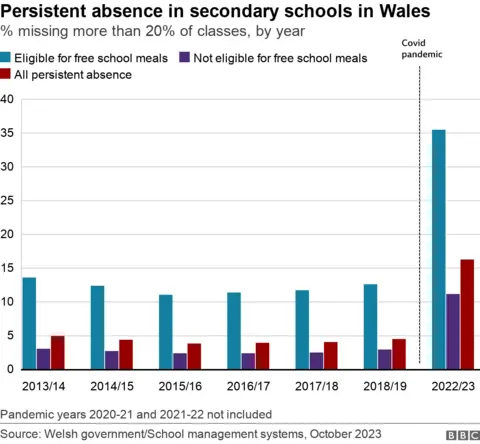School attendance: Thousands more to be classed as absent
 Getty Images
Getty ImagesThousands more children will be classed as "persistently" absent from school as part of Welsh government plans to tackle an attendance "crisis".
It is hoped that redefining persistent to include pupils missing 10% of school sessions - compared to the current 20% - will address the problem earlier.
The move will bring Wales in line with what is happening in England.
While supporting families to get children back in class is key, fines will be brought in as "a last resort".
School attendance is in crisis, according to the Welsh government and school leaders, as data suggests absence levels are almost double what they were before Covid.
There are lots of complex reasons for that - such as mental health issues and cost of living pressures - some of which have been made worse by the pandemic.
Education Minister Jeremy Miles said addressing it was his "number one priority".
Some children have struggled to return to busy schools and for others, the habit of going to school every day has been broken by all the disruption.
Children with additional learning needs and pupils living in poverty are more likely to be absent.

What is 'persistent absence'?
At the moment pupils are said to be persistently absent if they miss at least 20% of half-day school sessions, the equivalent of about 30 school days.
That is being changed to 10%, which is the definition already used in England.
Recent figures for secondary school children using the old definition showed 16.3% of pupils aged 11-15 were persistently absent in the last school year - three times higher than pre-pandemic levels.
It was 35.6% for pupils eligible for free school meals.
Now the threshold has changed, that figure will jump even higher, but ministers said this meant problems could be identified earlier to target help.
It often acts a trigger to get extra support from the Education Welfare Service, for example, that works with schools and families to try to address attendance and wellbeing issues.
 Getty Images
Getty ImagesWhat happens when a child is repeatedly absent?
The guidance says good relationships with families is crucial and communication with parents about the importance of attendance and punctuality should be clear, as well as the consequences of missing school.
Many schools have Family Engagement Officers who can offer specialist support to help get pupils back to class and more regular absence might involve referrals to an Education Welfare Officer.
When are fines used?
Local authorities and schools decide whether a Fixed Penalty Notice should be issued.
"Such fines are used in extreme cases, when all efforts to engage the family have been tried and failed in having an impact", the guidance says.
A warning should be issued in the first instance and schools should consider whether a fine will be effective.
A 'national crisis?'
That is the view of a school leaders' union.
The Association of School and College Leaders Cymru said schools do not have enough money to tackle the problem.
The Welsh Conservatives said they would reverse school funding cuts and offer more targeted support for young people who miss school because of mental health issues.
Plaid Cymru has said more needs to be done to address the impact of poverty on attendance and tackle barriers such as transport costs.
